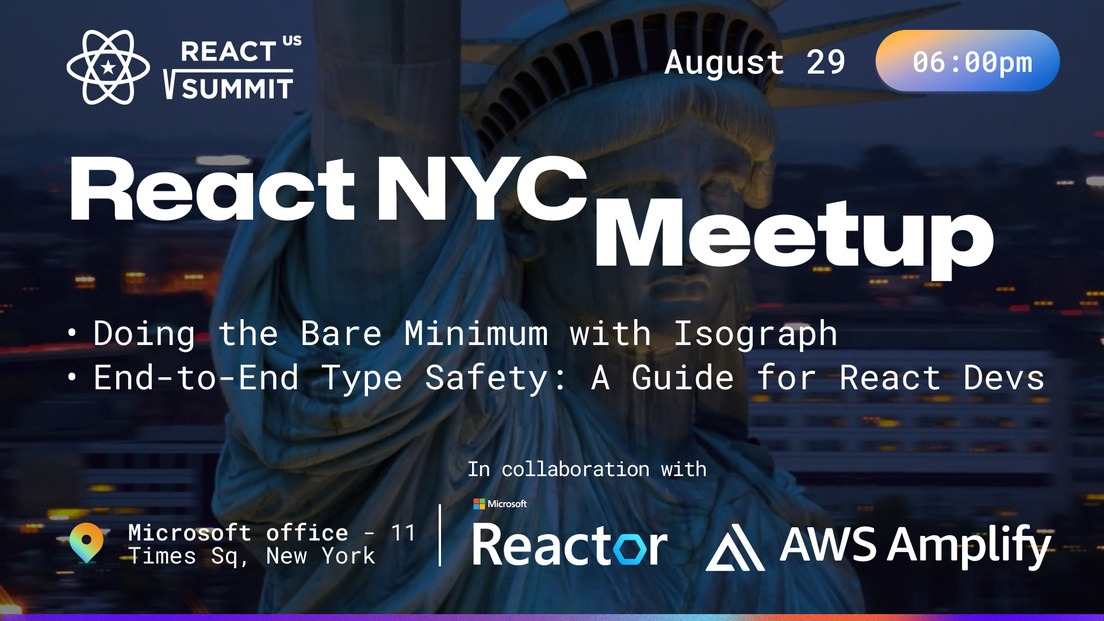
React.NYC Meetup - Type Safety, Isograph & more

Hosted by
React.NYC
Thursday, August 29th 2024
6:30PM to 9:00PM EDT
In-Person
Address available to attendees
We missed you this time around!
👋 Hey-hey, New York!
We hope you're all doing well and getting excited because the new meetup season is just around the corner!
We are thrilled to announce that our upcoming meetup will be on August 29 at Microsoft office.
If your company has a space to host our next event, please reach us here.
🕑 Event Schedule
18:00 - Doors open
18:30 - Intro and announcements
18:45 - Doing the Bare Minimum with Isograph – Robert Balicki
19:05 - End-to-End Type Safety: A Guide for React Devs – Erik Hanchett
19:25 - Open Mic talks - show your project, open source work or a small demo of what you learned recently
20:30 - Mingle until 21:00
🗣 To propose a talk for our next meetups please fill in the CFP form.
🤝 In collaboration with
Huge thanks to Microsoft Reactor for hosting the event!
Microsoft Reactor provides events, training, and community resources to help startups, entrepreneurs and developers build their next business on AI technology.
🤝 Sponsored by
Kudos to our sponsor AWS Amplify!
AWS Amplify is everything frontend developers need to develop and deploy cloud-powered fullstack applications without hassle. Easily connect your frontend to the cloud for data modeling, authentication, storage, serverless functions, SSR app deployment, and more.
This event made possible thanks to the support from React Summit US & JSNation US organizers - GitNation.
👍 Code of Conduct
By registering for this event you agree to comply with our CoC
📩 Contact
Presentations
Robert Balicki
Doing the Bare Minimum with Isograph
In a web app, the enemy of performance isn't bad algorithms — it's bloat. From loading the least data and JavaScript to re-rendering the fewest components in response to changes in state, the most performant apps are the one that do the least. But it's often hard to maintain a small bundle while iterating on features.
Enter Isograph, the framework for building data-driven React apps. It leverages a compiler to provide great DevEx and performance, right out of the box.
In this talk, find out how Isograph lets you:
- load component JavaScript and data only when needed, for example when the user is about to scroll to them
- load components (such as a VideoViewer) only if an item of that type (a Video) is returned from the server, and
- defer loading parts of your component tree, without server support.
And the cherry on top? We're doing it all in userland. 😎
But wait, there's more! We'll also show how Isograph re-renders the absolute minimum of components and garbage collects data that's no longer needed, allowing your app to stay consistently performant. So let's prove the old adage: less is more performant.
Erik Hanchett
End-to-End Type Safety: A Guide for React Devs
When writing a fullstack application a common problem facing developers today is keeping data consistency between the frontend and backend. What the backend expects and what the frontend sends is not always the same.
In this talk we’ll look at this problem and different approaches to solve it. We’ll take a look at how AWS Amplify approaches this problem and show a demo. We’ll also compare and contrast other TypeScript approaches with React and Next.
Platform Sponsors

Don't let broken lines of code, busted API calls, and crashes ruin your app. Join the 4M developers and 90K organizations who consider Sentry “not bad” when it comes to application monitoring. Use code “guild” for 3 free months of the team plan.
https://sentry.io

Torc is a community-first platform bringing together remote-first software engineer and developer opportunities from across the globe. Join a network that’s all about connection, collaboration, and finding your next big move — together.
Join our community today!

We missed you this time around!
Platform Sponsors

Don't let broken lines of code, busted API calls, and crashes ruin your app. Join the 4M developers and 90K organizations who consider Sentry “not bad” when it comes to application monitoring. Use code “guild” for 3 free months of the team plan.
https://sentry.io

Torc is a community-first platform bringing together remote-first software engineer and developer opportunities from across the globe. Join a network that’s all about connection, collaboration, and finding your next big move — together.
Join our community today!
React.NYC Meetup - Type Safety, Isograph & more

Hosted by
React.NYC
Aug
29
Thursday, August 29th 2024
6:30PM to 9:00PM EDT
In-Person
Address available to attendees
👋 Hey-hey, New York!
We hope you're all doing well and getting excited because the new meetup season is just around the corner!
We are thrilled to announce that our upcoming meetup will be on August 29 at Microsoft office.
If your company has a space to host our next event, please reach us here.
🕑 Event Schedule
18:00 - Doors open
18:30 - Intro and announcements
18:45 - Doing the Bare Minimum with Isograph – Robert Balicki
19:05 - End-to-End Type Safety: A Guide for React Devs – Erik Hanchett
19:25 - Open Mic talks - show your project, open source work or a small demo of what you learned recently
20:30 - Mingle until 21:00
🗣 To propose a talk for our next meetups please fill in the CFP form.
🤝 In collaboration with
Huge thanks to Microsoft Reactor for hosting the event!
Microsoft Reactor provides events, training, and community resources to help startups, entrepreneurs and developers build their next business on AI technology.
🤝 Sponsored by
Kudos to our sponsor AWS Amplify!
AWS Amplify is everything frontend developers need to develop and deploy cloud-powered fullstack applications without hassle. Easily connect your frontend to the cloud for data modeling, authentication, storage, serverless functions, SSR app deployment, and more.
This event made possible thanks to the support from React Summit US & JSNation US organizers - GitNation.
👍 Code of Conduct
By registering for this event you agree to comply with our CoC
📩 Contact
Presentations
Robert Balicki
Doing the Bare Minimum with Isograph
In a web app, the enemy of performance isn't bad algorithms — it's bloat. From loading the least data and JavaScript to re-rendering the fewest components in response to changes in state, the most performant apps are the one that do the least. But it's often hard to maintain a small bundle while iterating on features.
Enter Isograph, the framework for building data-driven React apps. It leverages a compiler to provide great DevEx and performance, right out of the box.
In this talk, find out how Isograph lets you:
- load component JavaScript and data only when needed, for example when the user is about to scroll to them
- load components (such as a VideoViewer) only if an item of that type (a Video) is returned from the server, and
- defer loading parts of your component tree, without server support.
And the cherry on top? We're doing it all in userland. 😎
But wait, there's more! We'll also show how Isograph re-renders the absolute minimum of components and garbage collects data that's no longer needed, allowing your app to stay consistently performant. So let's prove the old adage: less is more performant.
Erik Hanchett
End-to-End Type Safety: A Guide for React Devs
When writing a fullstack application a common problem facing developers today is keeping data consistency between the frontend and backend. What the backend expects and what the frontend sends is not always the same.
In this talk we’ll look at this problem and different approaches to solve it. We’ll take a look at how AWS Amplify approaches this problem and show a demo. We’ll also compare and contrast other TypeScript approaches with React and Next.
Get in touch!
hi@guild.host